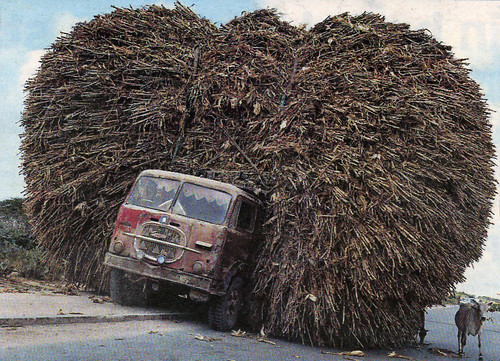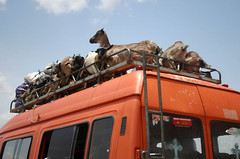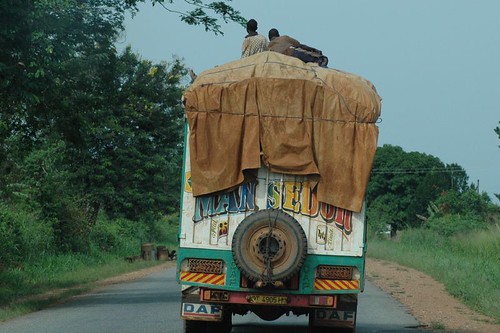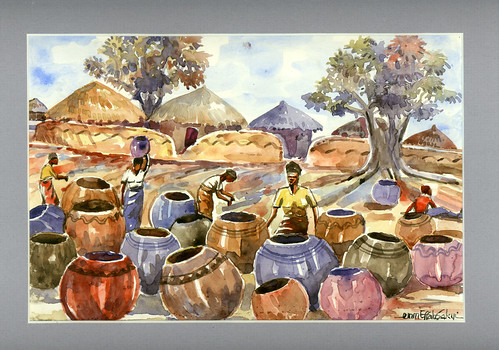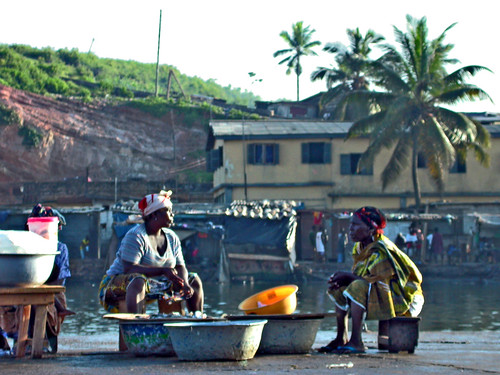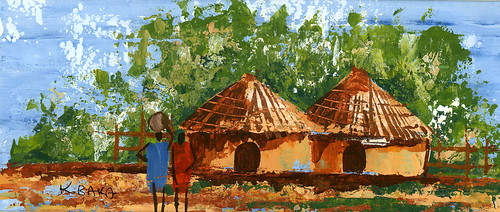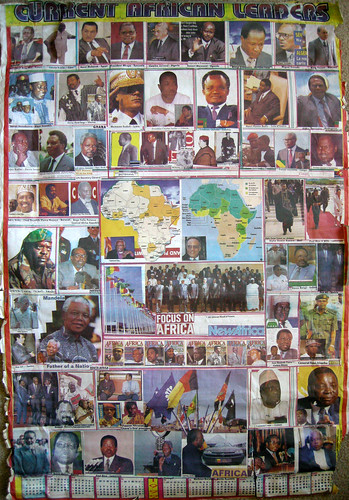I thought I'd share this poster of African leaders circa 1999 which has been lying around my study for just such an occasion — actually, I was cleaning things and stumbled upon it...
I've been
mulling a piece on Africa in 1989 to give some depth to my ongoing series and trying without success to find the equivalent poster from that year - the high mark of rogues in Africa, hence I'll start with a request: does anyone have any similar photos from 1989? Photos of any OAU meeting would work for my purposes. As to the matter at hand, I suppose the more recent history of 1999 will do as a stopgap measure.
So. Africa. 1999. Here goes...
Posters of this sort are quite popular in Africa (
large size), you'll find them at many of our
newstands. I don't quite believe in the Great Man theory but, when it comes to Africa in 1999, one has to admit that leadership still mattered a lot unlike in other regions of the world. To take an obvious example, no one in their right mind would be putting up similar photos of EU leaders on the walls of their houses. Public apathy to leadership in the West is rightly the norm - modulo the occasional gremlin. In West Africa especially, where we know all too well about Big Men - and they are all men in the calendar, Ellen Johnson Sirleaf was
barely on the horizon at that point, these posters serve as a kind of palliative: "Get to know your local strongman", wear their
political cloths and so forth.
Even the good guys were larger than life in 1999; that was the year
Nelson Mandela stepped down as president of the New South Africa proving his George Washington bonafides, the Good "Father of the nation" as the poster notes. In 1999, we didn't have many technocratic Thabo Mbeki or John Kufuor types as we do presently. Instead you'll note a lot of military uniforms and panache. The
2007 contingent are a
mostly dour bunch other than say,
He of The Little Green Book -
Gaddafi that is, or
Robert Mugabe, and Bad Bob has always worn a gray suit since hanging up his rebel spurs. That dourness is paradoxical progress, you don't want to live in revolutionary times. By contrast the typical words used in the western press about our leaders in 1999 were things like "
mercurial, flair and flamboyant".
Strictly speaking it's not 1999, the calendar was produced in late 1998 as evidenced by the presence of the late, unlamented General
Sani Abacha of Nigeria on the right hand side who died just months earlier. When people literally celebrate your demise to the point of dancing in the streets (as they did even in nearby Accra, Ghana), you've obviously been smothering them.
Still the 1999 crop of African leaders were a definite improvement on the 1989 crop but you could still see a high percentage of strongmen, thieves and incompetents. Even with the comforting gaze of
Kofi Annan and
Desmond Tutu (
Julius Nyerere and
Kwame Nkrumah are on hand to round out the nostalgia quotient), there is precious little comfort in this poster.
The Rogues Gallery
Charles Taylor (top left) was then president of Liberia, a decade after starting his mischief in the sub-continent. He had reached his peak of warlord power having coerced a terrorized populace into voting for him or else. And it was a case of "or else" that he proceeded to display: the white suits were flowing, the timber and blood diamonds were in abundance, the concessions had been
granted to Pat Robertson, and the flowering friendships with Jesse Jackson and company proceeded apace. But he wanted it all, so Sierra Leone, Guinea and even Cote d'Ivoire would pay the price. May he suffer a
lifetime of legal action, and the company of
lawyers and bureaucrats.
Laurent Kabila the First, had been installed a couple of years earlier in Congo and was taking bids on concessions in the fashion of his predecessors in mischief, Mobutu and
King Leopold... He was a disappointment to his Rwandan and Ugandan sponsors, refusing to deal with the Hutu génocidaires and indeed allying himself with them at times. The consequence of the free-for-all his inaction spawned was that the armies of 13 countries would scramble to get the spoils of Congo in the middle of Africa's world war. Sadly the
headlines are much the same almost a decade later. The
heart of darkness...
Gnassingbé Eyadema, the
Prince of Darkness is
ominous at the bottom right and for once depicted without his
dark shades. To this day none of my Togolese friends discuss politics with me, so long a shadow does he (and now his progeny) cast.
Jonas Savimbi,
Jerry Rawlings and
Gaddafi are their customary gremlin selves - merchants of grist.
Jammeh of Gambia, in army gear (red cap just above the Africa maps), is holding up a little prop (sorry, I meant a little boy) - he wasn't claiming to cure AIDS back then (as was the case last year), but the visions of grandeur and the lucrative arms smuggling were going well.
The leaders of the various Guinea countries were grim.
Conte of Guinea was simply corrupt - he still is.
Joao Bernado Viera of Guinea-Bissau, having survived a 1998 coup and minor civil war, was cracking down on the opposition - he would fall in mid 1999 (he is back in power currently). The less said about
Teodoro Obiang Nguema Mbasogo of Equatorial Guinea the better - 1999 was a typical year for his brand of malfeasance.
Al-Bashir of Sudan with the army uniforms behind him headed
no-nonsense and efficient killers.
Buyoya of Burundi wasn't up to much good.
The military leader of Niger,
Ibrahim Baré Maïnassara would be assasinated in April 1999. His replacement wasn't much better.
Kleptocrats and Autocrats
The usual suspects are there.
Daniel Arap Moi of Kenya - stylish and mercenary,
Paul Biya (and Wife) looting Cameroon,
Hosni Mubarak the Egyptian hardman as usual. Like Mubarak,
Ben Ali of Tunisia and bad old
King Hassan of Morocco kept a lid on things in their countries. Too exuberant your expression of liberty and you risked the secret police. Algeria too was in the midst of that savage civil war;
Liamine Zeroual, backed by the army — "Les décideurs" was what members of that cabal were called, was deciding for everyone.
Idris Deby of Chad was caught between a rock and a desert and had no imagination.
Blaise Campaore of Burkina Faso and
Didier Ratsiraka, the canonical Big Man of Madagascar (the nickname: the Red Admiral) had quiet years.
Omar Bongo was as usual
enjoying and corrupting, spreading enough money around to
compromise any opposition - as he continues to do, the Head Suborner. Nothing much to see here, let's move on...
The Disappointments
The biggest disappointment was
Henri Konan Bédié of Cote d'Ivoire who was ensconced in that most comfortable chair. Despite being groomed for decades by Houphouët Boigny, he wasn't up to the task. His country is
still paying the price for his small-mindedness.
Frederick Chiluba of Zambia (arms crossed and self-confident) was quickly losing his democratic lustre - he would be voted out of office a few years later and continues to face corruption charges.
Abdou Diouf of Senegal is an odd one. Ostensibly a democrat, he eventually handed over but he was increasingly autocratic the longer he was in power.
The Ethiopians (Zenawi) and Eritreans (Afewerki) decided they needed to engage in pointless border wars and old-fashioned trench warfare ensued. Tens of thousands perished.
Museveni was sowing his mustard seed in Uganda - democracy was for chumps in his considered opinion. One party state, baby.
Kerekou of Benin still can't point to any thing that he's done for his country; in 1999, the priorities were clear, it was all about the money.
The Mistakes
These posters are of the cut and paste variety and were put together in a hurry; sometimes one forgets to update things or misattributes. Thus
Habayarima Juvenal of Rwanda, who had been killed to kick off the 1994 genocide, is still listed.
Paul Kagame should be annoyed.
For Burkina Faso there is also the image of supposedly saintly
Thomas Sankara, killed a decade earlier. File under misplaced nostalgia.
The Swazi king and the Lesotho prime ministers aren't listed for whatever reason.
Complications
Sierra Leone in 1999 was all complexity. President
Tejan Kabba clearly had a precarious grip on power, the evidence being the enigmatic "Sierra Leonean rebel leader" in green beret and army fatigues on the left hand side who appears ominously on the same poster. And indeed Sierra Leone was in the midst of its long civil war.
Sidenote: the only unambiguous good deed in foreign policy of Tony Blair's tenure would come a few years later when he sent a detachment of British troops to save the day in Sierra Leone. For that alone, one might arguably cut him some amount of slack for the later hubris on Iraq. Arguably... But you won't get that argument from me, my litmus test was his eloquent silence as Israel was bombarding Lebanon last summer until the atrocities crossed his very flexible threshold of manufactured disgust. He did do the right thing on Sierra Leone, Africans will give him that...
In the other Congo, the situation was confused and confusing.
Patrick Lissouba is depicted in the poster although he had been overthrown by that other gun runner
Sassou-Nguesso; his militia did came close to overrunning Brazzaville that year. Years later, one assumes he is still itching for a return from exile.
Somalia, after a decade as a failed state, gets any number of warlords on the poster: Aideed, Ali Mahdi are the convenient stooges.
Not depicted is Monsieur Bin Laden who brought his brand of collateral damage to the continent in the 1998 Al Qaeda attacks on the US embassies in Kenya and Tanzania. The grass always suffers... Back in 1998/99, he didn't care much for the limelight.
Passing grades
I wouldn't want my jaundiced commentary to give the impression that there were no good leaders on the poster or in Africa in 1999. Indeed there were many good things happening on the continent and often inspite of the leaders. Also, and this is the great virtue of Africa at that moment, much of the action on the continent was in civil society, in entrepreneurs, in schools and in business. Governments mattered less.
Ange Felix Patasse of the Central African Republic and
Miguel Trovada of Sao Tome and Principe could argue for a passing grade in 1999 (later is a different question). Similarly
Konaré of Mali - a country that probably has the strongest democracy on the continent, did good. The leaders of Malawi (
Muluzi), Tanzania (
Mkapa) and Botswana (
Masire) were all sense and sensibility. Heck even
Chisano of Mozambique was proving reasonable in reconciling his countrymen after their long civil war. For what it's worth also,
Sam Nujoma of Namibia did no harm in 1999.
Waiting for an Angel: Reading Africa in 1999
Between a Dream and a Nightmare was how Human Rights Watch described Africa in their 1999 world report. There's a touch of hyperbole perhaps, but there is much to commend in their lyrical commentary. Africa in 1999 was a case of baby steps.
Sidenote: Boston University had the idea to find sinecures for African leaders so that they would have something to do when they retired - basically give lectures about their embezzlement, grand visions and such. When I lived in the Boston area, I never attended the various symposiums that were organized - it irked me no end that these rogues would be feted instead of jailed. Perhaps I've mellowed somewhat, but I now think such efforts are a step in the right direction. Baby steps...
Back to reading 1999... There was the matter of
angels and demons, and I've previously pointed to contemporaneous posters showing the way in which religion had gotten a big boost in much of Africa. We were in need of much faith healing and the reason was leadership. Popular culture and the literature reflected as much.
Nigeria, by virtue of heft, sets the tone for much of Africa hence, for the best reading material on Africa circa 1999, I'll turn to
Helon Habila's Waiting For An Angel. This was actually a far more assured debut than that of
The Anointed One in that is a novel that really sought to capture the totality of a society's experience of that moment.
Habila is an ambitious writer and he presents a series of shifting but interlocking stories - the glue is a doomed journalist and a few students, but he covers considerable territory in his lyrical pages. In a sense it is the moral dilemma of
Ayi Kwei Armah's The Beautyful Ones Are Not Yet Born, updated for the fin de siecle: will no one do the right thing?
His laconic tone and journalistic eye really captures the mood: the sense of dread and inevitability of life under Abacha. Simply put it was a time of suffocation, of repression and of corruption. To call what Abacha wrought in Nigerian society bad behaviour is to give bad behaviour a bad name. What took place in Nigeria was greed beyond belief and utter wickedness, leavened periodically with tawdry murders. Murder was most foul, theft was most blatant, and all relationships were corrupted.
I can also point to some maternal toli with observations about this period; in 1999, it was
a matter of confidence in Nigeria. Nigerians are still picking up the pieces years later.
I haven't dwelled much on the francophone aspects but perhaps a few words are in order. France these days is having a touch of
buyer's remorse at its
back-scratching enablement of
African rogues. One then should also add to the reading list
Ahmadou Kourouma's En Attendant Le Vote Des Betes Sauvages completed in 1998. That too takes on the Eyadema figures (and many of those other knaves I've listed). Magic realism was our lot and the great wordsmith doesn't disappoint in his cultural observations.
Where Habila is waiting for an angel, Kourouma is
waiting for the wild beasts to vote. A clear eyed look at the poster and at those leaders should explain why these two great stylists of African prose would write as they did about waiting for the next shoe to drop. If the one hoped for change for the better, the other was more cynical about the prospects - and perhaps given the slow pace of change in Africa, Kourouma had the clearer eyes. But as a matter of policy, I'll side with Habila; demons may have more fun but angels are more likely to inherit the earth.
Between a dream and a nightmare is a twilight zone of opportunity; that is the terrain of
the great game and the temptations of
the rough beast. As we have seen, leaders do matter, but I'd hazard that
people matter more. It wasn't so in 1999 but with baby steps, perhaps it is more so today. Would it always be so.
- Eric B. & Rakim - Follow the Leader
Braggadocio and inner turmoil never sounded so good. Certainly Rakim never sounded so good, a microphone fiend he handed allcomers a musical massacre with his lyrics of fury. Follow the money, follow the leader.
- Prince - 1999
A double album opus with Linn drum programming mastery, the obvious line to contribute to the playlist is from the title track: "Party over, oops, out of time". I quite like some of the other, lesser-played songs on 1999: Delirious and the very apt Something In The Water (Does Not Compute). What say you Dear Reader?
- Femi Kuti - Plenty Nonsense
I was going to pick a Fela track to round of this playlist, perhaps Unknown Soldier - the line about Government Magic always gets me, but I think Femi had already proven himself by then and a more contemporaneous song was warranted. The title should speak loudly to my point: we're doing better these days but we all need to be vigilant about the plenty nonsense that goes on in our lands.
Baby steps.
P.S. It's been suggested that I should get some technology toli out the door, we'll see what we can come up with. Stay tuned...
File under: Africa, politics, poster, leaders, observation, history, culture, rogues, Fallen Angels, Things Fall Apart, toli
